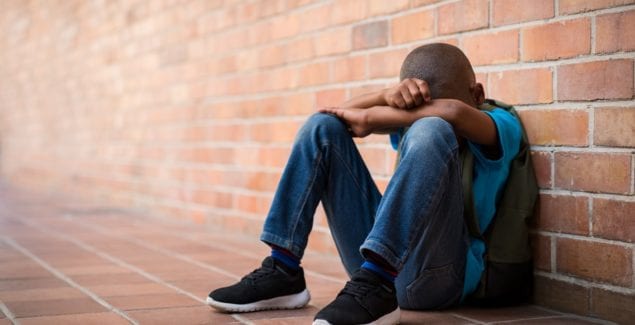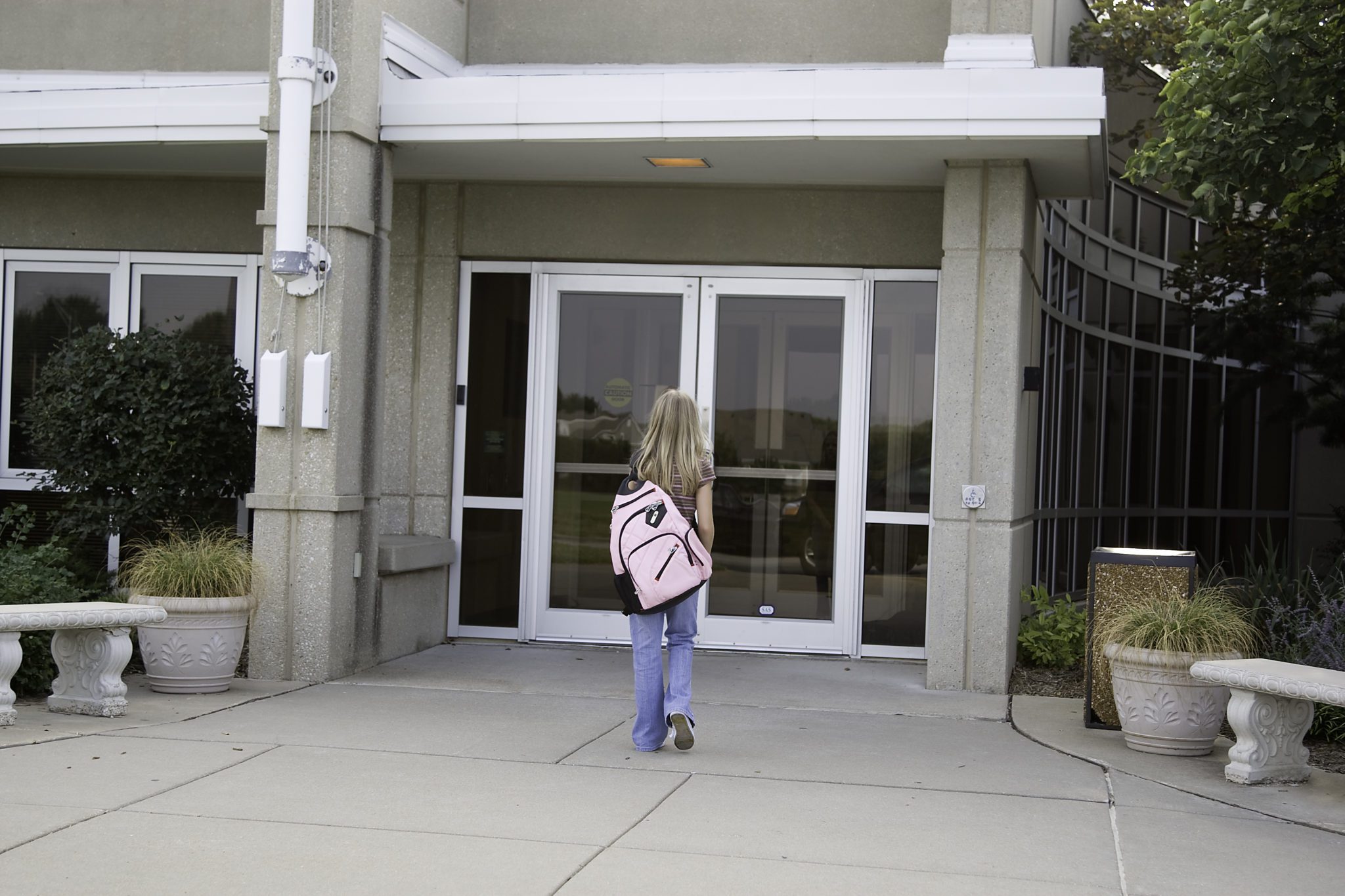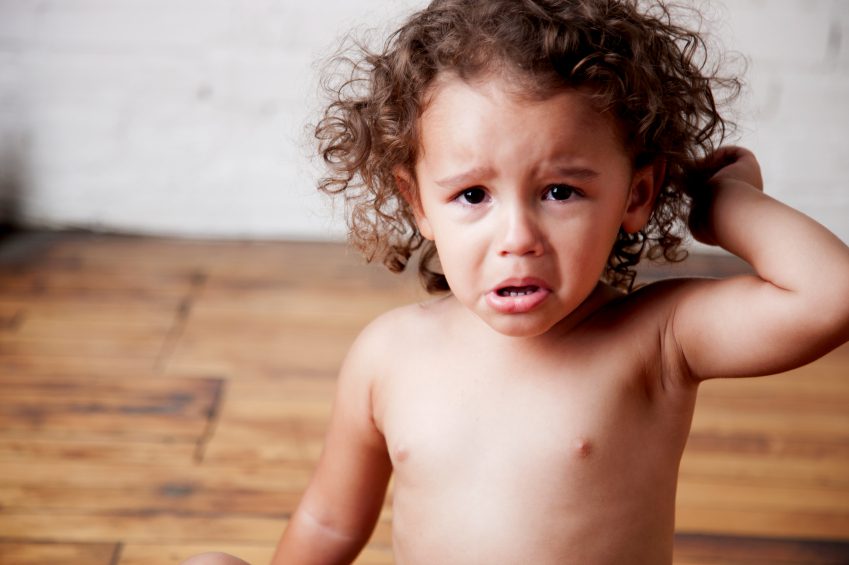School Refusal: When Back-to-School Is a Struggle

Posted in: Grade School, Parenting Concerns, You & Your Family
Topics: Mental Illness + Psychiatric Disorders
Jump to: Ways to Help
Most school-age kids are typically eager to head back to school after a break. Sure, they’ll miss their vacation, but the prospect of seeing friends again, moving up a grade, or even having a new teacher can be exciting.
Yet, for a few kids, it’s a nightmare. And when children struggle to go to school, it can be upsetting for both the children and their families.
Hear Dr. Beresin and Dr. Booth Watkins talk through school refusal. Tune in below, or search for ‘Shrinking It Down’ wherever you stream.
Here are a few stories from years of experience. I’ve changed the details to keep things anonymous, but let’s face it. These kinds of issues are pretty common:
Tommy, age six, was headed for kindergarten. Day after day, his dad felt humiliated, literally dragging a kicking and screaming Tommy down the street as they walked to school. And one time a school attendant, who didn’t know dad, asked Tommy if he knew “this man.” Tommy’s father was mortified when he realized that the school official thought Tommy was being kidnapped.
Sarah, age 11, has had a tough time getting to school since she started almost five years ago. She flatly refused to take the school bus with her friends, so her mom had to drive her… or, at least try to drive her. Even if mom could get Sarah to the school parking lot, there was no way Sarah was getting out of the car without a surprisingly spirited fight. When mom did manage to get Sarah through the front door of her elementary school, and leave, Sarah would tearfully demand that her mother be called, or fly to the nurse’s office in a sheer state of panic. As a result, mom often had to miss work to pick Sarah up.
Susie, age 10, suddenly had a terrible time getting to sleep at night. She was up for hours, always worrying about school. It also became virtually impossible to wake her in time to get ready to leave in the morning. When she was finally up and dressed, she complained of stomach aches, or a sore throat, or she simply broke down in tears. Her mother brought her to the pediatrician many times, but nothing was ever found to be wrong.
These are all cases of school refusal.
What Is School Refusal?
The term “school refusal” can be a bit confusing, because it is not, itself, a disorder. It is simply a term to describe the situation in which a child or teen will not go to school. That said, school refusal is a symptom of some bigger problem. There might an anxiety disorder. There might be a relationship problem in the family or with peers. One fact is for certain. No matter the cause, school refusal is very distressing for both the child and the parent.
While school refusal usually begins between the ages of five and 11, it can also happen in the teens years. And while it affects less than one in 20 kids, it often occurs after a long break from school, or after a stressful event in the child’s life. Stressful events are almost always interpersonal in nature. The child might have new troubles with a peer or teacher. The problem also might get better as the school year progresses, but it can come roaring back after school vacation.
What are the signs of school refusal?
- Children or teens with school refusal:often complain of physical complaints such as headaches, stomachaches, or other kinds of pains.
- They might express fears of impending doom, or worry especially that something horrible will happen to parents and other loved ones. These fears can lead to states of panic.
- In younger kids, crying and temper tantrums are common.
- In older kids, threats to family or even self-harm may be a part of the picture.
One way to know if these behaviors are related to school refusal is if they get better or stop when the child is allowed to stay home.
But remember that we said that school refusal is a symptom of a bigger problem, not a disorder itself. So, what are some of the challenges that can lead to school refusal? And what can be done to help?
Is It a Psychiatric Disorder?
Younger children may have Separation Anxiety. In this case, the child experiences terror when apart from a parent. This terror may not occur only with going to school. Whenever parents go out and the child is left with a baby sitter can spark an explosion of fear. Separation anxiety is often associated with the terrified conviction that something terrible will happen to the parent unless the child is present.
Other children will have Panic Disorder. Panic attacks typically include feelings of terror, rapid heart rate, hyperventilation, dizziness or nausea. Many young children with panic attacks will not be able to describe these physical symptoms, but when these symptoms occur, the child may simply have an impressive and stubborn tantrum. When these physical feelings of panic are associated with the place in which they occur, a formal phobia can develop. The phobia can be associated with school, (hence the term “school phobia”) but can also occur at the mall, or a restaurant, or driving in a car. Unfortunately, if school is the “phobic stimulus”, school itself takes on monumental proportions and the child quite naturally refuses to be exposed to the place that triggers the panic.
Other anxiety disorders and conditions can also cause school refusal. Social phobia – the fears of criticism and exclusion by friends – is common. Obsessive compulsive disorder can also cause school refusal, often causing shame and discomfort should the child be seen by peers during a repeated ritual such as hand-washing. Other times a traumatized child will develop post-traumatic stress disorder and the accompanying avoidance leads to a refusal to attend school. Then there are many situations that are not the result of specific psychiatric syndromes but that are nevertheless equally debilitating.
A child might be the victim of bullying and is overwhelmed by the fear and shame they feel in the company of peers. These kids may not stop with school avoidance. Often they’ll avoid all social situations.
Depression is not an uncommon associated psychiatric disorder that results in school refusal. When a child is depressed, the reluctance to go to school may be due to low mood, poor concentration or motivation, and/or the academic difficulties that can result from depression.
Is It a Family Issue?
Family problems may be a part of school refusal, either alone or in combination with psychiatric disorders. Below are just a few examples.
Some form of trauma can contribute to school refusal. Children who witness domestic violence, or who have been abused or neglected, may develop post-traumatic stress disorder. Though it may seem paradoxical that serious or dangerous family challenges would make a child want to stay home, many children fear that if they leave, some loved one will be hurt.
In other situations, the family’s style might lead to over-dependent relationships and insulation from interactions with others. Children get the message that the family must always stay together to prevent harm.
In some instances, a family member might be medically ill. The child feels the need to help at home and many times does in fact play a significant role in the caretaking. The child therefore becomes conflicted about leaving. Other times, the child might act out, garnering attention and thus taking the focus away from the more serious illness. This occurs with life-threatening or debilitating illnesses such as cancer.
Ways to Help
Treatment for school refusal is essential. It is critical to help the child maintain their natural developmental in order to keep pace with their peers. In this sense, the longer that school refusal persists, the more likely it is to precipitate future circumstances that facilitate even more stringent refusal. The effects of not attending school are profound and well documented. Children suffer academically, socially and emotionally.
Some ways to support your child at home include:
- Talk About It. Ask your child about what makes going to school so hard. It’s important to learn more about what’s going on for them, to help you get to the root of the problem.
- Be Clear and Firm About School. Set clear rules on the conditions under which staying home is acceptable (vomiting, diarrhea, COVID symptoms, etc.), and make it clear that otherwise they are expected to go to school.
- Problem-Solve With Your Child. Think together of ways to address the what’s making it so hard to go to school. Role-play with them. Come up with creative scripts for them to use when they go back or to handle issues at school.
- Work With the School. You can also work with their teacher or someone else at the school to create a plan to gradually get them back into the classroom. They may need to return in phases; small steps until they are able to return to full time. With your child and the school, identify trusted people that your child can turn to should they need additional support at school.
- Be Positive. Speak in a positive way and focus on the good aspects of school, friends, favorite subjects, special teachers, or fond memories or experiences. Try to strike a balance of being positive while also validating what they are feeling and experiencing. Try hard not to shame or blame your child for not going to school.
Typical types of formal treatment include:
- A Psychiatric Evaluation. Conducted by a pediatrician and a mental health clinician, a psychiatric evaluation is performed to determine biological and/or psychological underlying causes of school refusal.
- Psychological Therapy For The Child. The main focus of this treatment is to help the child get back to school and to participate in normal routines. This may involve systematic desensitization, a process by which slowly diminishing the scariness of school for the child is achieved through a step-by-step fashion. Therapists might employ relaxation techniques such as meditation to reduce anxiety; cognitive-behavior therapy, in which the thoughts about school, home or peers that are exaggerated or distorted are corrected; social skills training if the child is developmentally behind or awkward with peers; or helping to manage trauma that the child experienced at home or in school. All these therapies must involve a coordinated effort involving a therapist, parents, teachers, other school personnel.
- Family Therapy. This is useful if there is excessive stress or trauma in the home. Helping the entire family to change how it behaves during times of duress often requires attention to the family system, as a whole.
- Pharmacological Treatment. Medications alone will not cure school refusal, but they can be helpful. If the child is depressed, anxious, or has panic attacks, medications have been shown to be effective in reducing symptoms.
So, let’s circle back. What happened to Tommy and Sarah and Susie?
Tommy was found to have panic attacks and a corresponding school phobia. Sarah had separation anxiety. And Susie had been repeatedly bullied in school. All three, through carefully coordinated treatment, ended up back in school full time within a year.
School refusal is terribly upsetting for the child and for the parent. And, treatment can take a fair amount of time and effort.
The good news is that treatment works. And the earlier you start a multidisciplinary approach to school refusal, the better.



 Share
Share Tweet
Tweet






